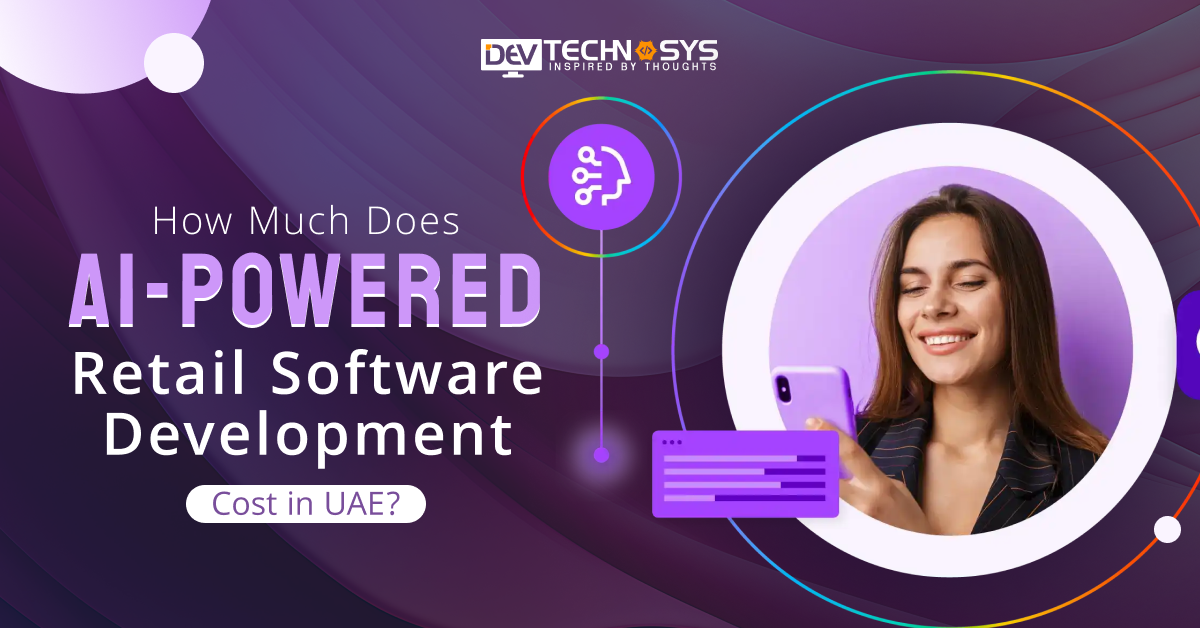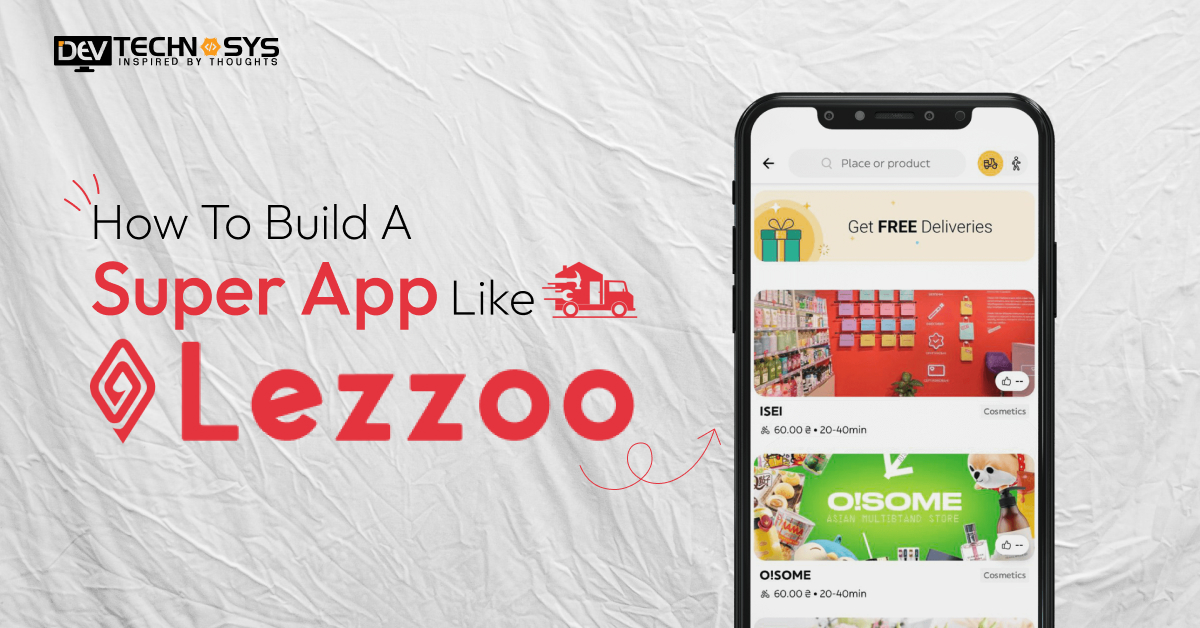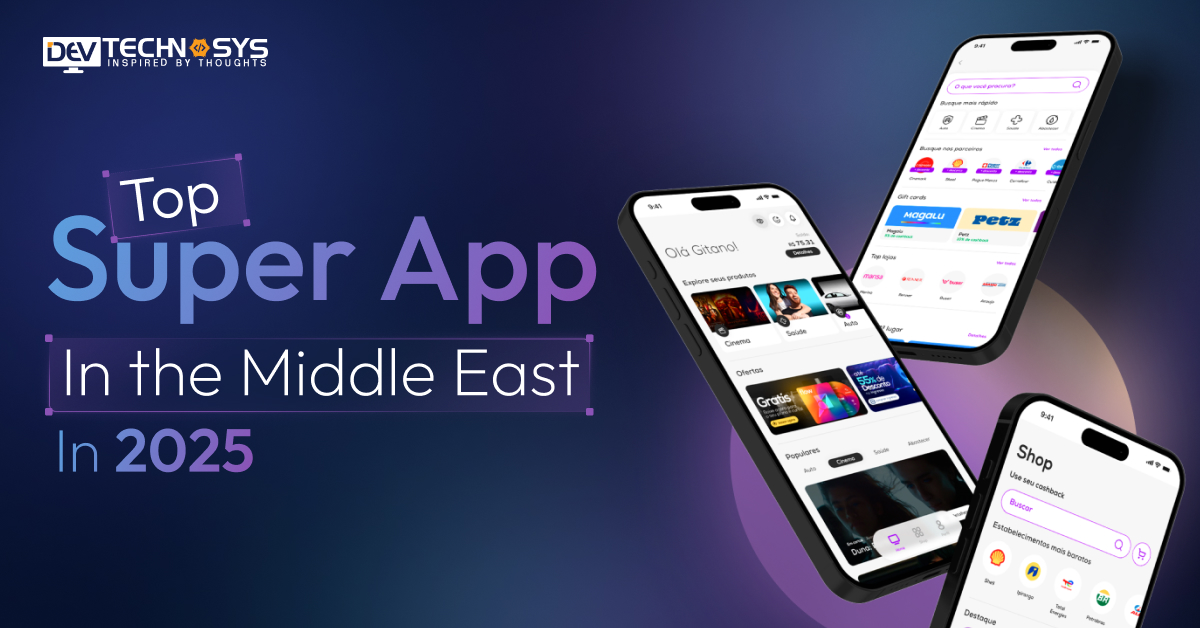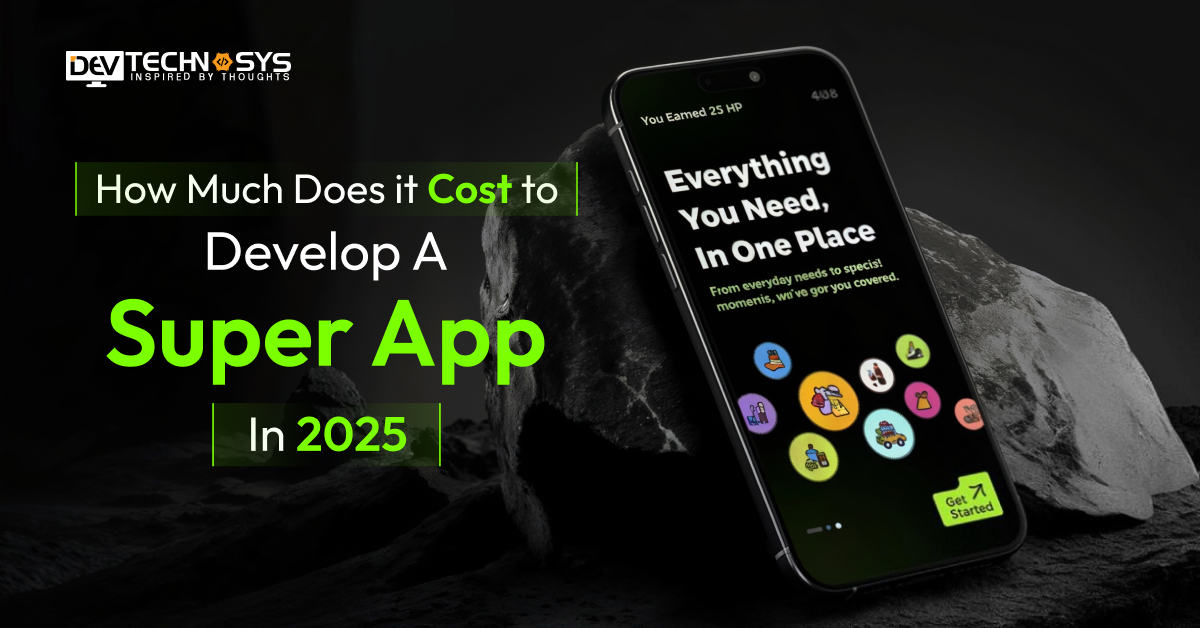AI is becoming a growing trend in the shopping industry worldwide. Retailers and supermarkets have adopted AI-powered retail software to make their businesses run more smoothly.
As per research, a massive 86% of retailers use AI or automation in some manner. Out of those, 49% have reported cost savings, 43% have experienced revenue growth, and 44% have noticed efficiency improvements.
As more retailers spend money on AI-powered retail software development, it is more essential than ever to stay ahead in a market that is evolving continuously. Although developing AI retail software can be quite expensive. So, it is essential to know the AI-Powered retail software development cost in UAE.
Thus, we will discuss AI-driven retail POS software cost, factors affecting the cost and other essential aspect that an improve your retail business.
So, let’s begin!
What is AI-powered Retail Software?
AI-powered retail software is a software application that helps retailers in making many parts of running a retail store better. It includes features like keeping track of stock, figuring out what customers want, and best shopping experience.
Additionally, they can analyze lots of information with the help of software to predict trends, find the best prices, and suggest goods to customers. It can also find fraud and automate jobs like customer service with chatbots. It helps stores make better choices, work more efficiently, and give customers a better experience.
Future Predictions & Projections of Retail Industry
- Retail sales around the world were expected to reach about 32.8 trillion U.S. dollars by 2026, up from about 26.4 trillion U.S. dollars in 2021.
- Shopping online on phones and apps still has a lower average order value than shopping online on desktop computers.
- The retail systems software market is expected to be worth $6.8 billion by 2031, after growing at a rate of 12.06% per year from 2024 to 2031.
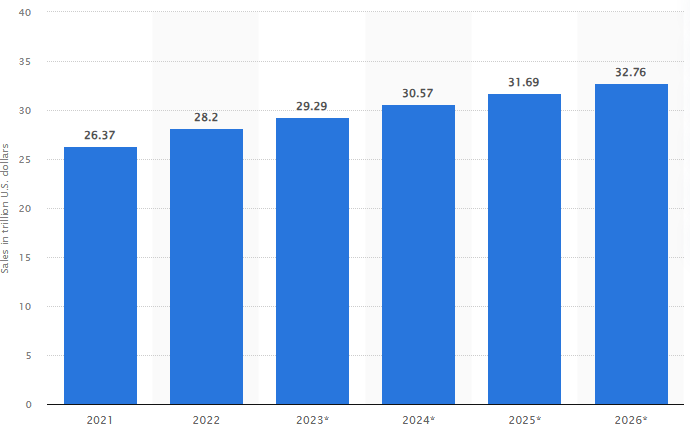
- It was thought that the world market for retail automation could be as big as $4 billion, and it is expected to grow to $33 billion.
- It is thought that these markets will grow to about $14 billion by 2030.
- A recent poll of retail leaders found that the three main benefits of AI were higher productivity, lower operational costs, and a shorter time to profitability.
Cost To Develop AI Retail Software in UAE
The AI-powered retail software development cost in UAE varies greatly as it depends on multiple factors. But we can provide a basic estimation. Basically, the cost to build AI-powered retail software can range between $10000 – $25000.
Let us say you just want to know the cost to make AI retail software for now. So, just to see what the market is like, let me give you a number.
|
Project Type |
Estimated Cost |
Development Time |
|
Basic AI Retail Software |
$10000 – $14000 | 2-3 months |
| Medium AI Retail Software | $14000 – $18000 |
4-5 months |
|
Complex AI Retail Software |
$18000 – $22000 | 6-8 months |
| Custom AI Retail Software | $25000+ |
9+ months |
Note: These are just the rough estimations. You can calculate the cost to create an AI-powered retail software using the below formula:
Total AI Retail Software Development Cost = Developers Rate * Development Time
It is suggested that you figure out exactly what it will cost to create your idea a reality by consulting to an experienced POS software development company that excels in making AI retail software.
Factors Affecting the AI Retail Software Development Cost
Now that you are well-versed with the cost to create AI-powered retail software, it is time to know about the crucial factors affecting it. So, here are the major variables that you must consider before investing the money in your project.
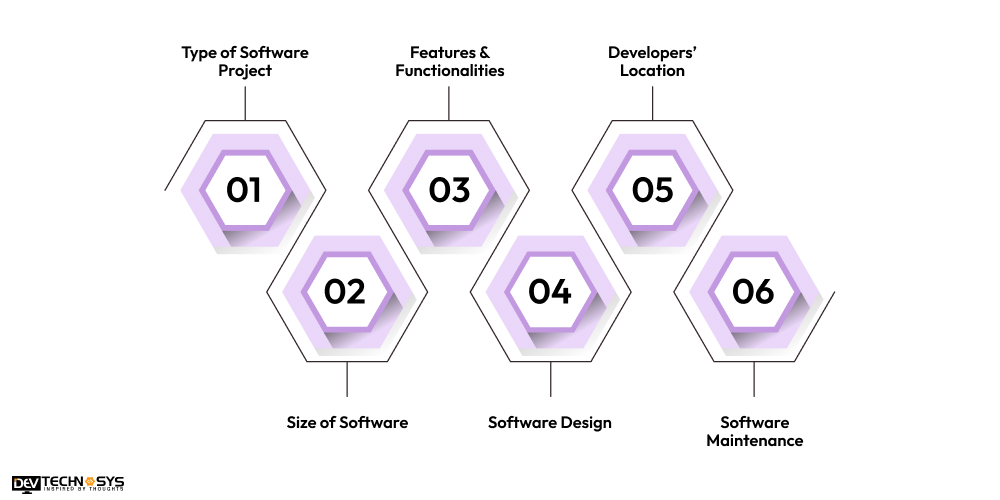
1. Type of Software Project
AI-powered retail software development cost is not always the same as other software. Basically, it fluctuates on the basis of type of project due to their in-depth nature and prominent role in retail business operations. Here are the type of software project:
2. Custom Retail Software Development
The AI based custom software solution majorly affect the cost. The custom AI projects include POS software development from scratch. It may be done with the good planning, strategy, designing, coding and thorough testing. The below table explains in more clear way.
|
Type of Software Project |
Estimated Cost |
| Basic Point of Sale System |
$8,000 – $18,000 |
|
Advanced POS System |
$10,000 – $24,000+ |
| Inventory Management System |
$10,000 – $20,000+ |
|
Customer Relationship Management for Retail |
$8,000 – $19,000+ |
3. Retail Software Integration
AI-powered retail software integration include different software systems to work together. The AI development company can integrate artificial intelligence where multiple apps within the same firms are interlinked.
Also, retail software can be linked with different software layers with a singe system. It can improve your overall project efficiency and data flow that can decrease the POS software mevelopment cost.
|
Software Project Type |
Associated Costs |
| Inventory Managemnt System |
$7000 – $15000 |
|
Payment Gateways |
$1000 – $6000 |
| API Integration |
$2000 – $5000 |
4. Retail Software Modifications
In such type of projects, the retail software development services team updates and modifies the existing AI retail software. For example, feature enhancements, error-fixes, changes in speed and agility and adjustment of software to business needs. Although, these retail projects requie a thorough expertise of existing retail software code.
|
Type of Retail Software Project |
Features | Costs |
| Adding new modules | Improving old functions New APIs |
$1000 – $2500 |
|
Error fixing |
Code analysis, debugging, security check | $1500 – $2000 |
| Performance tuning | Speed optimization, load testing, cache |
$800 – $2500 |
2. Size of Software
The size of your AI retail software can majorly affect the AI retail software development cost. To better understand this, you must check out the below table that contains the price of each retail software size.
|
Software Size |
Costs |
| Small Scale Business |
$10000 – $15000 |
|
Mid Scale Business |
$15000 – $20000 |
| Large Scale Business |
$20000 – $25000 |
3. Features & Functionalities
The range of features greatly influence AI-powered retail software development cost. Complex features AI retail software pricing UAE more than simple features like invoicing and payment processing.
The total cost to develop retail software increases with the number and intricacy of the features you require. Customizing functionalities to meet specific business requirements can also affect the overall custom AI retail software cost estimation.
|
Feature/Functionality |
Costs Estimation |
|
Sales Processing |
|
| Point of Sale (POS) |
$1,000 – $2,000 |
|
Payment Processing |
$500 – $1500 |
| Receipt Generation |
$200 – $500 |
|
Inventory Management |
|
| Stock Tracking |
$500 – $2,000 |
|
Automated Ordering |
$2,000 – $4,000 |
| Reporting & Analytics |
$500 – $1,500 |
4. Software Design
UI and UX design are important for AI retail software because they affect both how users interact with and think about the software clone. UI/UX design is complicated because it includes things like visual aspects, the user journey, and how easy it is to use in general.
Visually appealing UI/UX design may make users happier and more likely to participate, but normally AI development costs more in time, effort, and money. This is a table that shows the cost to create AI e-commerce software based on the UI/UX design.
|
Design Level |
Description |
Estimated Cost Range |
|
Basic UI Design |
Simple interface for basic AI features | $3,000 to $5000 |
| Standard UI/UX Design | User-friendly interface with good UX for core AI functionalities |
$4,000 to $6,000 |
|
Advanced UI/UX Design |
Complex interface with seamless integration of multiple AI features |
$5,000 to $7,000 or more |
|
Premium/Enterprise-Level Design |
Highly customized, cutting-edge design with advanced UI/UX for large-scale AI retail solutions. |
Exceeding $8000 |
5. Developers’ Location
The next factor affecting the AI-powered retail software development cost is the development team you hire. If you hire retail software developer, the cost could be higher if they are located in expensive areas or major technological centers.
As an alternative, you can tap into a large pool of qualified candidates by hiring from the Middle Eastern regions like UAE. They bring cutting-edge knowledge and unique ideas to the table, that helps keep project expenses in check without sacrificing quality of service.
|
Regions |
Cost Estimation (Hourly) |
| UAE |
$15 – $25 |
|
Canada |
$40 – $60 |
| Australia |
$30 – $70 |
|
Belgium |
$50 – $100 |
| New Zealand |
$40 – $120 |
6. Software Maintenance
Lastly, the cost to develop AI retail automation software UAE is also influenced by the software maintenance. Let’s say, you have a retail software which is outdated and you want to modify it with new features. Also, you want to fix the bugs and check security issues.
Overall, a small modifications and updates cost of AI retail solutions UAE you less as compared to complex modifications in your retail intelligence software. Below table contains the factors:
|
Maintenance Task |
Description | Estimated Cost (Monthly) |
| Corrective Maintenance | Bug fixes, error resolution |
$500 – $2,000+ |
|
Adaptive Maintenance |
Updating for new OS, hardware, etc. | $200 – $1,000+ |
| Support | Help desk, troubleshooting |
$500 – $3,000+ |
|
Security Management |
Monitoring, vulnerability scans | $200 – $1,000+ |
| Compliance | Updates for regulations |
$100 – $500+ |
Key Features To Add In AI Retail Software Development
To build an AI-powered retail software, you must incorporate the essential features that can help you stand out in the market. Take a look at the features of AI retail software development UAE:
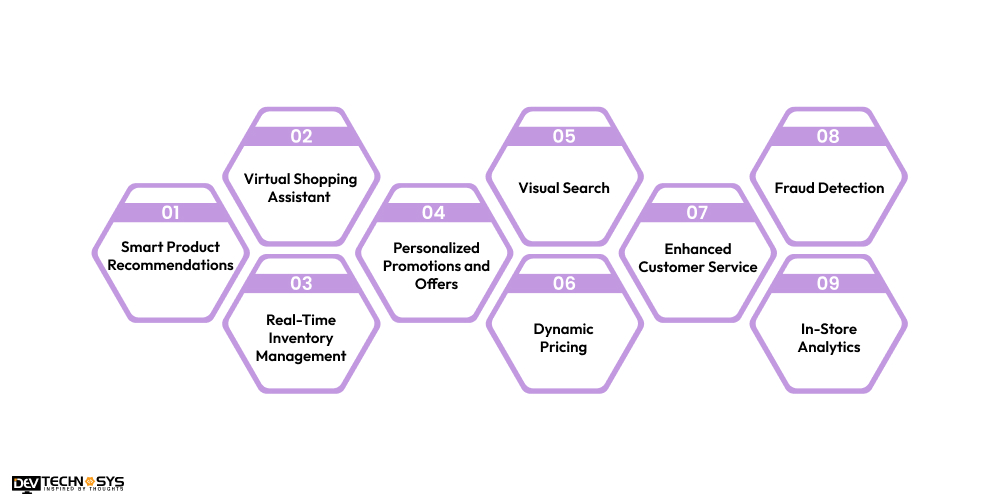
1. Virtual Shopping Assistant
A chatbot that can answer questions, help people find goods, and even give them advice. With the help of an E-commerce app development services provider, you can integrate this feature. This could lead to better customer service and easier shopping.
2. Real-Time Inventory Management
It is suggested that the system keep monitor of what products are in inventory and where they are kept. This keeps things from running out and makes sure customers can find what they need.
3. Personalized Promotions and Offers
The software should be able to make promotions and deals that are specific to each customer based on what they like. This can make marketing work better and make customers more loyal.
4. Visual Search
Customers should be able to look for goods with pictures. It is possible for them to take an image of a dress they like in a magazine, and the software will then find similar things in the store’s stock.
5. Smart Product Recommendations
The AI development software should be able to look at information about customers and offer items that they might like. This can lead to more sales and makes shopping more personal.
6. Dynamic Pricing
Prices should be able to be changed in real time by the software, taking into account things like demand, competition, and stock levels. This helps stores make the most money and stay ahead of the competition.
7. Enhanced Customer Service
The software clone can look at interactions and comments from customers to find ways to improve customer service. It can also offer personalized help through chat, email, the phone, and other methods.
8. Fraud Detection
It is expected that the system will be able to spot and stop fraud like credit card fraud and return fraud. This helps keep the store’s business and customers’ data safe.
9. In-Store Analytics
Through cameras and sensors inside the store, the software can figure out things like which lanes customers go to and what they buy. You may use this skill to improve the layout of your store and where you put your products.
Industries Leveraging Retail Intelligence Software
Retail intelligence software builds solutions that are specific to different industries. This lets businesses deal with their own practical problems and make processes more efficient.
Here is a full list of all the ways that retail intelligence software clone can be used in different fields:
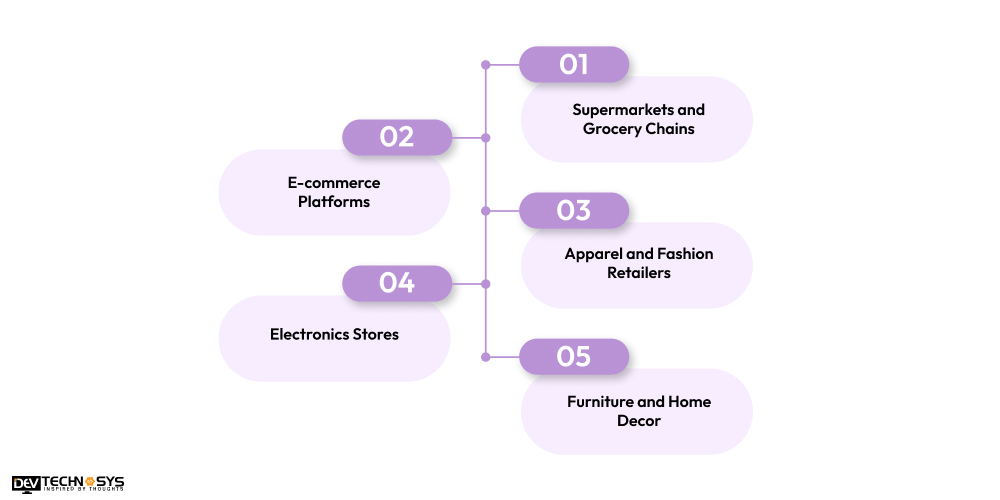
1. Supermarkets and Grocery Chains
Grocery stores and supermarkets need to be very careful with their inventory management and supply chain processes. The retail intelligence software development gives online retail business the tools they need to predict demand, keep track of perishable inventory, and improve the customer experience.
Use Cases:
- Demand Forecasting: To make an accurate prediction of demand, advanced programs look at sales patterns and outside factors like seasons or events. This cuts down on food waste and makes sure there is enough stock.
- Dynamic Shelf Allocation: Using real-time data to find the best places on shelves for goods that are in high demand helps boost sales and make customers happier.
2. E-commerce Platforms
Personalization and quick changes to operations are great for a shopping app development company. They can improve their products and services by using retail business intelligence tools to learn more about how customers behave.
Use Cases:
- Personalized Product Recommendations: Uses AI to look at browsing habits and past purchases, then makes ideas that are more likely to be bought.
- Dynamic Pricing Models: It can change the price right away based on information about competitors, changes in demand, and customer tastes. This makes sure that pricing strategies are competitive.
3. Apparel and Fashion Retailers
In the fashion business, it is important to stay on top of trends and keep track of inventory well. The E-commerce app development meets these needs by giving retailers tools for predicting trends and making the best use of their stock.
Use Cases:
- Trend Analysis: Looks at sales and social media data to find new fashion trends. This lets product and marketing plans be changed quickly.
- Loyalty Programs: Custom-made loyalty programs give discounts, sneak peeks, and special deals to customers who buy from you often, which makes them more likely to stick with you.
4. Electronics Stores
Electronics retailers have to deal with complicated things like managing warranties and cross-selling. Retail software development solutions UAE that use artificial intelligence can make these tasks easier, which improves customer service and makes operations run more smoothly.
Use Cases:
- Warranty and Service Management: Keeps track of product warranties and sets up automatic service reminders, which makes customers happier and more loyal.
- Return and Refund Automation: Makes it easier to send things back by processing approvals and looking at trends to find ways to make customer service or product quality better.
5. Furniture and Home Decor
The furniture business needs better customer relations and better coordination of the supply chain. Smart store solutions help companies deal with these problems in a good way.
Use Cases:
- Supply Chain Visibility: Keeps track of all stages of production, supplies, and delivery to make sure everything runs smoothly and delays are kept to a minimum.
- Delivery Optimization: Looks at where customers are, how much space vehicles have, and delivery times to make processes easier and make customers happier.
How To Monetize Your AI-Powered Retail Software?
If you want to drive a huge profit and celebrate growth, then you must leverage various monetization strategies. So, let’s have a look at the main revenue streams to boost ROI.
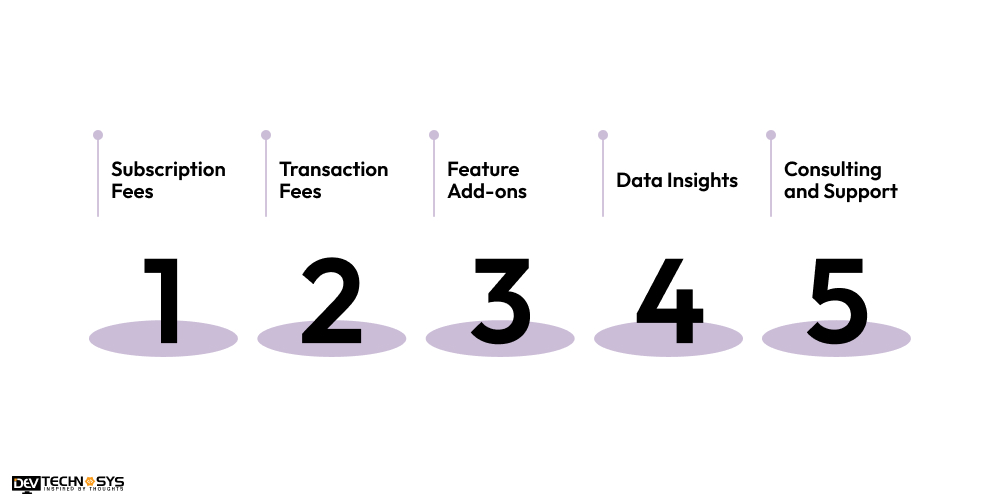
1. Subscription Fees
Retailers should pay a set amount each month or yearly to view and use your software. It is kind of like a Netflix account; they pay to use the service. You might set different levels, like basic, premium, etc., with different benefits and limits on how much you can use them. This means that smaller companies can get by with a basic plan, while bigger companies have to pay more for more advanced tools.
2. Transaction Fees
Take a tiny percentage of every sale that your AI store software clone helps to make. You might get a small cut of a sale if your AI helps a store suggest a product that ends up being bought. This makes your rewards match the success of the store.
3. Feature Add-ons
You could also charge a fair custom AI retail solutions cost for the core retail software clone and extra for added features. It is kind of like buying things inside the shopping app development solution.
Premium add-ons could include things like advanced data, personalized marketing campaign tools, or the ability to connect to certain platforms.
4. Data Insights
It is possible that your AI in retail industry UAE is collecting useful information about how customers act, product trends, and other things.
You can sell this data to market research firms or other companies that are interested in shopping trends after making it anonymous and putting it all together.
5. Consulting and Support
The best thing you can do is help stores get the most out of your tools as a consultant. This could include setting up the system, training, custom configurations, and ongoing assistance. You are selling more than just software. You are also selling your knowledge.
Final Thoughts
Developing retail software with AI is no longer just a trend; it is now necessary. In order to stay ahead of the competition, businesses are trying to use new technologies.
AI can help retailers in a lot of different ways, whether they want to enhance their user experience or get better at running their business. It is amazing how well AI can be used, which leads to more personalized suggestions and higher conversion rates.
Thus, you can avail retail software development company in UAE that are powered by AI and improve customer engagement with chatbots that answer their questions right away.
FAQs
1. How Long Does It Cost To Develop Retail Software?
The estimated cost to make retail software fluctuates on the basis of different aspects. For instance, software complexity and size, functionalities, software design and maintenance. Generally, the cost to build retail software can be between $10000-$25000 or more.
2. How Much Time Will It Take To Create AI Retail Software?
The estimated development time of AI retail software can be between 2 – 6 months. However, your retail project requirement affect the overall software cost.
3. How To Develop AI Retail Software?
To create AI-powered retail software, you should follow the below steps:
- Conduct market analysis
- Know your competitors
- Design user interface
- Develop software backend
- Test and deploy
- Software maintenance
4. How To Reduce the Cost To Create AI Retail Software?
To reduce the cost to develop AI-powered retail software, follow the below tips:
- Agile development methodology
- Develop an MVP first
- Code review and quality assurance
- Do thorough market research
5. What Are the Popular AI-powered Retail Software?
- Maverick
- TensorFlow
- ai
- ManyChat
- Clarifai
- Fast.ai



